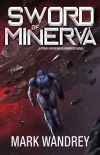Sword of Minerva (The Guild Wars Book 10) by Mark Wandrey (good books to read for teens txt) 📗

- Author: Mark Wandrey
Book online «Sword of Minerva (The Guild Wars Book 10) by Mark Wandrey (good books to read for teens txt) 📗». Author Mark Wandrey
Sato had dropped three of them, but the last one got a hit in, and Sato shuddered to a stop. Like a light switch, the ninja was gone, and the awkward scientist was back. Rick rewound the scene and replayed it several times. He’d only allocated a few sensors to watch Sato, and there wasn’t enough resolution to tell what the monkey had done to him. It looked like he’d just touched Sato’s head, and the scientist reset.
It wasn’t a drug, Rick knew. It had to have something to do with the cobweb glove. He decided if an opSha came at him, he’d shoot first and ask questions later. He reran the fight one more time, and was struck by Sato’s expression. It was calm, determined, and businesslike. He’d seen the look on mercs’ faces. The old guys who’d been in the shit more times than they could remember. The guys you didn’t fuck with. Ever.
He noticed Sato shaking his head and brought his entire attention back to the present. “Anything?”
“Nothing,” Sato said, glaring at the Enigma cube. “Sooner or later I’ll remember how to get into this thing.”
“Maybe it’s an enigma because there’s nothing inside?”
Sato laughed and looked at him, then frowned. He turned back to glare the cube. “I guess we’ll see.”
A few hours later, and with many more systems working properly, they adjusted their speed and course as stargate rendezvous became imminent.
“Stargate will open at exactly 13:33:39,” the stargate controller radioed. They’d wired the payment hours ago, otherwise they’d be facing a warning from the stargate. You could sneak through with other ships, or race through without the stargate control being able to do anything about it. However they would record the ship’s ID and pass the information on. It would be difficult to keep running your starship without being able to use a stargate ever again.
“Last chance to say goodbye to Earth,” Sato said. “I don’t think I’ll ever return.”
“Good seafood,” Dakkar said from the console he was still working on.
“What about you, Rick?” Sato asked.
“I said my goodbyes already.”
They entered the stargate.
* * * * *
Chapter Four
It was good to get back into space. It had been good eight weeks ago, anyway. Vestoon was a never-ending project, and Rick wasn’t what anyone would call mechanically inclined. He was a serviceable wrench turner, if it wasn’t much more complicated than a wrench. The kind of stuff he’d done right after lifting off Earth was easy enough. Helping Sato measure the quantity of Astatine-222 in the hyperspace wave generator with a nuclear magnetic resonator was a lot more than turning a wrench.
“How long does this stuff last?” Rick asked as he tried adjusting the angle again.
“Oh, hundreds of thousands of hours in hyperspace,” Sato replied. “Raise it another millimeter, and to the left slightly.”
Rick moved the sensor head. “That’s 600 or more trips through hyperspace.”
“I said hundreds of thousands,” Sato said, emphasizing the plural in hundreds. “The element is a freak, and degenerates in a somewhat unpredictable manner. I’ve noticed from monitoring Winged Hussars ships that the smaller the ship, the more power it takes to maintain the hyperspace field, and the faster the astatine degenerates.”
Rick grunted and moved the sensor a tiny amount. “How’s that?”
“Yeah, you got it.” Sato examined the instrument while it gathered data. “Astatine-222 is a freak, just like F11. Only created in some unknown phenomenon.”
“Where does it come from?” Rick asked as he waited.
“Nobody knows. If they did, it wouldn’t be worth thousands of credits a gram.”
“Wow, I thought F11 was expensive.”
“Luckily it doesn’t take a large amount. The one-mil-thick coating on hyperspace wave carriers is sufficient and will last forever. However, key parts, like this wave generator, bear the brunt of the generator’s full output, so this is a rod of pure A-triple-2. It degenerates from the high heat.”
Rick could understand the last part. His hands, a few millimeters from the rod, said it was nearly a thousand degrees. “You said you can only test it under load?”
“Correct. The nature of the metal makes it impossible to scan cold. You also don’t want to heat it with a torch; its melting point is razor thin.” Sato gestured at the rod. “On most ships, they have engineering bots do the monitoring. Since they take readings every time they’re in hyperspace, it’s easy to tell if it’s wearing down.”
“How’s ours?”
“I’ll know in another minute.”
Time passed slowly. “Dakkar is getting big,” Rick noted.
“It’s the tilapia tank we put in,” Sato explained. A 1,000-liter tank split into multiple compartments, it was intended to supplement the ship’s fresh food supply in the form of hydroponics-grown vegetables and extra oxygen. A byproduct was genetically engineered tilapia that fed on the plant wastes. Dakkar had discovered the fish a week into the trip. He didn’t eat them all. In fact, he was careful to only consume them as they matured. The fish grew up fast, and the Wrogul had been eating them as fast as they grew. “The Wrogul are effective omnivores; however, they grow best on a meat diet.”
The sensor beeped, and Sato examined the output before cursing something in Japanese Rick’s translator didn’t pick up. “Just like everything else on this ship, it’s worn out.”
“How bad?” Sato had begun checking hyperspace components after their last jump, when the powerplant had been consuming 5% more energy than it should have. From what Rick had learned, such an increase in power consumption wasn’t a big deal on a larger ship. They had more power to spare. Vestoon’s main powerplant produced 125% of the power needed to keep them in hyperspace, a pretty narrow margin. Its backup was incapable of making enough by itself. If the main failed, they had a big problem.
But if the main couldn’t keep up, that





Comments (0)